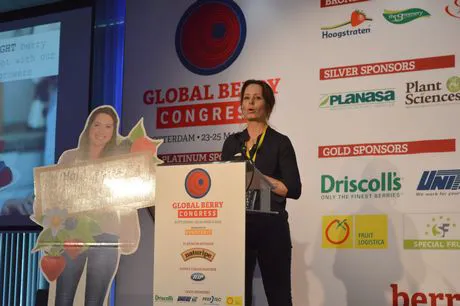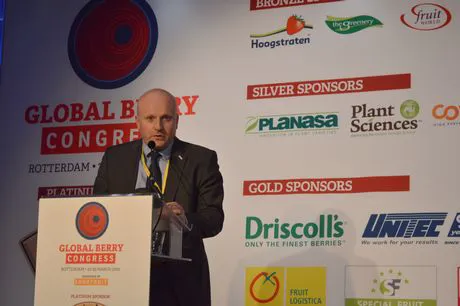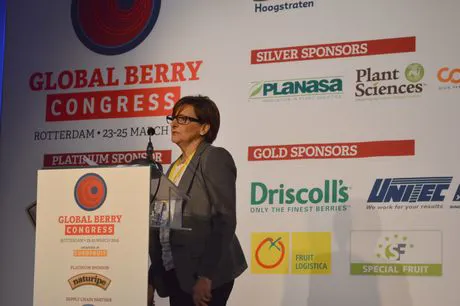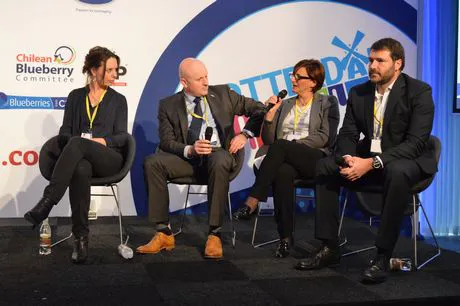In the soft fruit sector labels and brand names are used in various ways. BelOrta works together with their clients to find suitable labels. Driscoll's uses the company name and focuses on quality, and the Italian 'Planitalia Club Candonga' puts strawberries on the market under the variety name. During the Global Berry Congress last week the various initiatives were discussed.

Marieke Appel from Driscoll's:"The question is not whether consumers want more soft fruit but whether the industry is ready for it."
Marieke Appel from Driscoll's took her cardboard 'friend' and consumer Kate with her. Kate is the personification of the company's target group. "A strong consumer brand can deliver high-quality products throughout the whole year and adds emotion," argues Marieke. "Through concentrating on the needs of consumers we can develop delicious, beautiful and fresh varieties that shoppers want to pay for. It is not whether consumers want more soft fruit but whether the industry is ready for it."
Impulse buy
Soft fruit is primarily a product bought on impulse and consumers are willing to pay for quality. A study by Driscoll's shows that 84% of respondents choose quality over price. In many countries in Europe the consumption of soft fruit is rising and the share of different berries is also rising. Where strawberries are traditionally consumed the most, there is a shift towards more blueberries and raspberries.
 Jo Lambrecht (BelOrta) talks about the Belgian soft fruit market. Belgian consumption behind
Jo Lambrecht (BelOrta) talks about the Belgian soft fruit market. Belgian consumption behindBelgium is still behind in this development. Jo Lambrecht from BelOrta gives some insight into Belgian consumption. On average Belgians eat 1.91 kilos of strawberries (per person) annually, of this 70% is purchased in the supermarket. This puts strawberries at the top. Raspberries, which come in second place, are consumed much less. On average Belgians eat 0.07 kilos of raspberries (per person) annually and approximately 21% of households buy the fruit. The consumption of all the other soft fruit together amounts to 0.13 kilos per Belgian annually. Within this category blueberries are at the top with 0.077 kilos per capita. A major reason for this is that the discounters have an important market share, but they do not have the different sorts of soft fruit in their assortment. "As far as berry consumption goes, Belgium has abandoned the stage of early adopters in the innovation cycle." concludes Jo.
But there is movement in the market. Due to increased interest among consumers various retailers have focused, in recent years, on offering beautiful, wide, cared for assortments of berries. "Together with our customers we put our berries on the market under different labels, under our own brand, under private labels and also sometimes under co-brands, in the basic, standard and premium categories. Positioning, choice of variety, the assortment and packaging, everything is done in close consultation with the retailer in question. Our producers follow strict specifications and manufacture to the highest standards. It is therefore logical that the next phase in the market is monitored very closely."
 Carmela Suriano talks about the brand and variety, Candonga.
Carmela Suriano talks about the brand and variety, Candonga.
Variety as a labelCarmela Suriano talks about the approach of the Italian Planitalia Club Candonga. In Southern Italy 250 acres of Candonga strawberries are grown by 15 members. In total around 11,000 tons per year are harvested. This year a harvest of 31,000 tons is estimated. The strawberries are marketed under the variety name. The label, Candonga, is promoted in various ways, for example by in-store promotions, gift packages and through meet-ups with chefs and traders. The strawberries brought in 11 to 20% more than the premium strawberries of other varieties in the second week of March.

During the ensuing discussion a prime question was whether supermarkets would like to participate in the 'variety as a label' promotion. And how does that actually work with growers? Are they willing to switch? The main conclusion is that supermarkets, and ultimately consumers, live up to the 'brand promise' label. Whether the label stands for a variety or not is of little importance. Variety promotion in supermarkets has caused a shift in the United Kingdom: supermarkets would only buy those varieties, after which the growers would switch.




